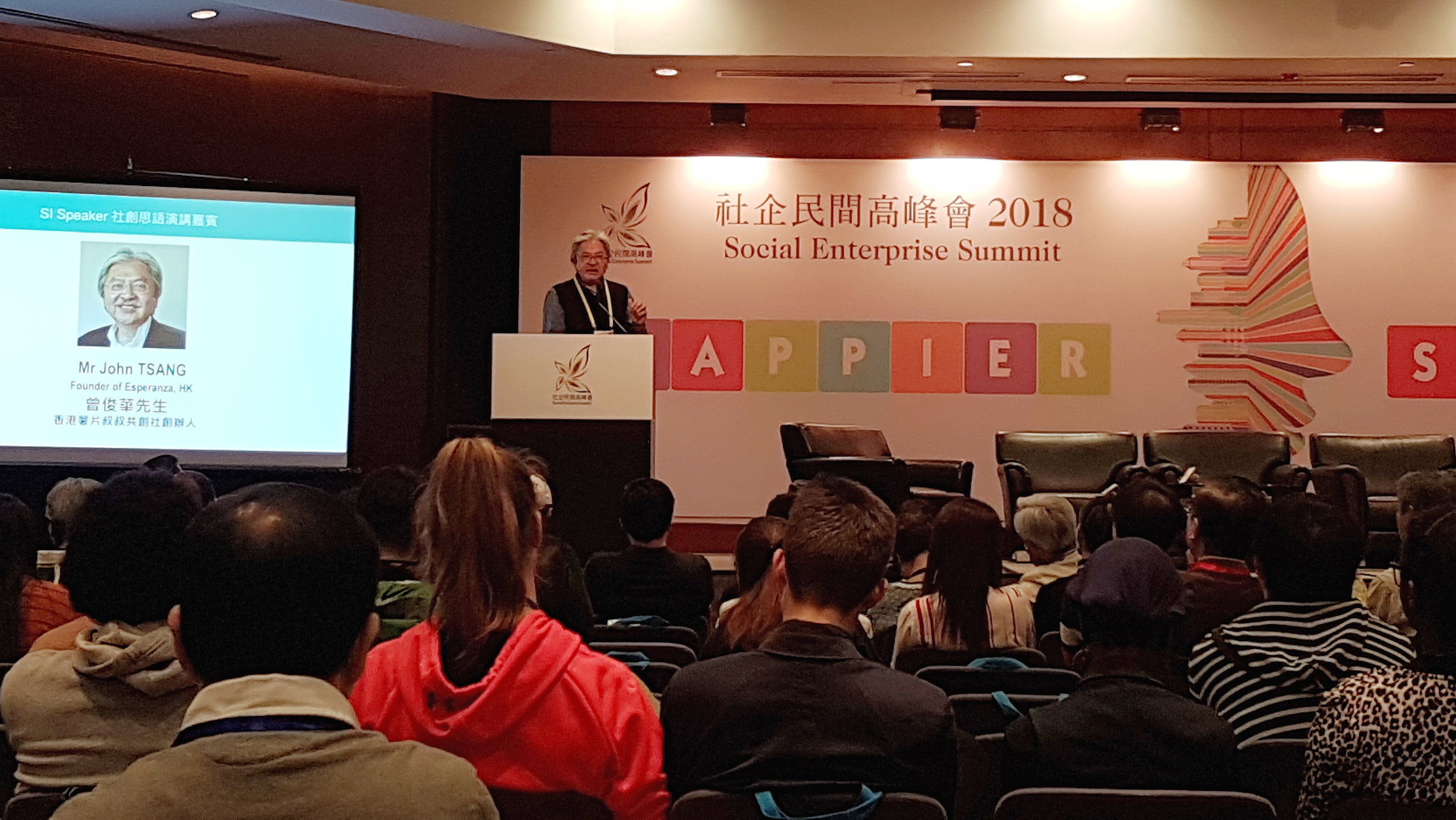Some people think Hong Kong can be a hard-nosed, apathetic place on the surface. But look a little deeper and you’ll find many people here have a generous capacity to “care” and design creative solutions to complex problems. That much is clear from our daily conversations with businesses, NGOs and social innovators. So what’s lacking?
By Martina Mok
Every week this fall, our team at Shared Value Initiative Hong Kong was out gathering insights and changing minds at talks, conferences, hackathons and countless events on sustainable development, impact investing, strategic philanthropy, social entrepreneurship and more. These ranged from the first Global Goals Jam Hong Kong and CSR Asia Summit to the HKMA Annual Conference and Social Enterprise Summit 2018.
After distilling the latest public discourse, below is our view of the five most topical social innovation trends in Hong Kong (and beyond) with immediate relevance to all companies looking to grow business in a more sustainable and inclusive way.
1. The social enterprise community is maturing and interacting more with companies, but there is a market gap with untapped value.
Hong Kong’s social enterprise (SE) scene is much more developed than the Shared Value circle, so we must work with that ecosystem under the umbrella of social innovation. The Social Enterprise Summit secretariat noted how much the SE community has grown in the eleven years since it started. Why is this relevant to companies? Most social enterprises are home-grown, with deep understanding of frontline realities. Often what they lack is reliable funding, resources to scale up, and a clear business case for investors.
More companies are partnering with social enterprises here, but they tend toward CSR approaches rather than integration with business expertise, or thorough analysis of business impact. On the flip side, social enterprises (and non-profits) must realise that companies have more to offer than dollars, equipment or volunteers, and that a more integrated business partnership, such as leveraging distribution networks, would generate more long-term value.
If a hotel partners with a social enterprise that recycles soap for the needy, what is the business value to the hotel? Reputation-building alone is a crutch and not directly measurable business value. Does the hotel pay for waste, and thus save money? Will that only be measurable once polluter tax is introduced? Why not tell that story as a win-win?
Another mismatch is in speed of action. Though modestly resourced, social enterprises are driven by their mission to deliver and rely on a profitable value proposition to survive. Many social entrepreneurs in Hong Kong are youth with a fierce passion and bias toward action over deliberation. As Hip Shing Hong Holdings’ Managing Director pointed out in talking about Our Hong Kong Foundation’s Big Little Things campaign, companies can spend a long time held up on why not, versus how might we – and more quickly?
Companies need not reinvent the wheel to address social issues in an economically viable way. Social enterprises have proven their models on a small scale, presenting an opportunity for companies to partner with and learn from them in adapting products and services for underserved market segments, while raising the bar for business discipline.
2. The Hong Kong Government is backing social innovation far and wide, inviting the private sector to fill market gaps in areas of need.
The Social Enterprise Summit 2018 concluded with the announcement of a Greater Bay Area collaboration between city-level social innovation centres in the region to foster the development of social entrepreneurship in tandem with economic growth. One of our advisors is the Hong Kong Government’s Social Innovation and Entrepreneurship Development Fund (SIE Fund). Promoting Shared Value has been a pillar of its work since at least 2015, supported by education and capacity-building for local companies.
On our first theme of mental health, government representatives acknowledged at a roundtable with NGOs and companies that the public healthcare system will not be able to close the gap in treatment capacity, so encourages the private sector to step up in that regard – among other aspects of the mental health lifecycle.
Just as the UN presented the Sustainable Development Goals as needing private sector action more than ever, Hong Kong has recognised that socioeconomic and environmental problems need corporate leadership and innovation. For any business leader responsible for strategy, innovation or external stakeholders, this momentum cannot be ignored.
3. Hong Kong is looking to develop its first local Social Impact Bond, so Pay For Success stakeholders are quickly mobilising.
Based on the success of social impact bonds in other regions, notably the UK, India and Korea, cross-sector players such as Our Hong Kong Foundation, intermediary Social Finance, UBS Optimus Foundation and others are actively exploring opportunities as the SIE Fund has invited proposals to structure Hong Kong’s first local Pay For Success (PFS) bond.
In brief, this bond structure enables the commissioner, such as the government, to transfer the risk of a large-scale investment in a social welfare service to private investors by paying a premium return after successful achievement of social outcomes (such as increased school enrolment). PFS also gives the non-profit service provider more flexibility to adapt delivery models for better outcomes, rather than being confined by output-focused KPIs.
The opportunity for financial service institutions is obvious as a new investment structure and deeper engagement model with social impact objectives. Companies should also keep this in mind as a public-private partnership option in designing solutions for complex, preventable social issues that benefit the greater public. This also coincides with the rise of impact investing and green finance, as covered in our October panel talk.

4. Hong Kong lacks standardised social welfare and impact data.
Too many companies have stopped at reporting inputs and outputs of corporate citizenship programs, and failed to measure outcomes and impact, meaning that cost-effectiveness to the business remains unclear. This is true for many CSR partnerships as well as well-being programs where it is hard to assess whether you have truly made any difference. To uphold the business case for a Shared Value program, measurement must start from the beginning.
Data is also a challenge in the social sector. We often hear that Hong Kong lacks standardised welfare and impact data, making it more difficult to evaluate effectiveness. Although several social impact measurement models are used by SEs and NGOs, such as SROI, Hong Kong lacks comparable data inputs. Several players are working to fill this gap, but certainly it can be considered an opportunity for organisations with related expertise.
A company cannot credibly claim that its improved mental health program creates Shared Value without the business tracking changes in absenteeism, presenteeism, insurance cost, resource usage (at minimum) and ultimately changes in employees’ mental well-being – hardest of all. Also, some results are better left as qualitative and some intangible value should not be monetised, but these are not excuses for simply assuming impact.
5. All starts and ends – or evolves – with Human-Centered Design.
If society’s big problems were easy to solve, they wouldn’t still exist. But the difficulty of improving hygiene in underdeveloped areas is not a lack of toilets, but whether introducing toilets are feasible and effective in that context, for those people.
I recently took +Acumen and IDEO’s course on Human-Centered Design for Social Innovation, as we tell companies every day to apply design thinking for Shared Value ideation. One stage that may be difficult for companies to apply in the context of social issues is prototyping. While traditional products for consumers may go through beta testing, experimenting with a new model for a vulnerable population has many risks. That said, by partnering with NGOs and social enterprises through a platform such as SVIHK, companies can mitigate risks by creating trusted feedback loops and opportunities to pivot.
From a local design thinking expert, we heard that Hong Kong broadly suffers from institutionalised ways of thinking, such that even if a government agency or school wanted to improve service delivery, it may be limited by system constraints that need to first change. Likewise, companies struggle with adopting Shared Value as it often requires transformation – in structure, process, culture – making the Hong Kong Management Association’s 2018 conference theme, “Transforming Businesses to Stay Ahead” highly relevant.
It’s not enough to come up with a creative idea. Does your organisation encourage experimentation? Do you have the freedom to test iterations, fail and learn, like a scientist? What do you first need to change, before doing things differently? Why recycle if you can change packaging? Why change packaging if you don’t need packaging?
Whether you agree or not with these trends, we’re keen for your feedback.

